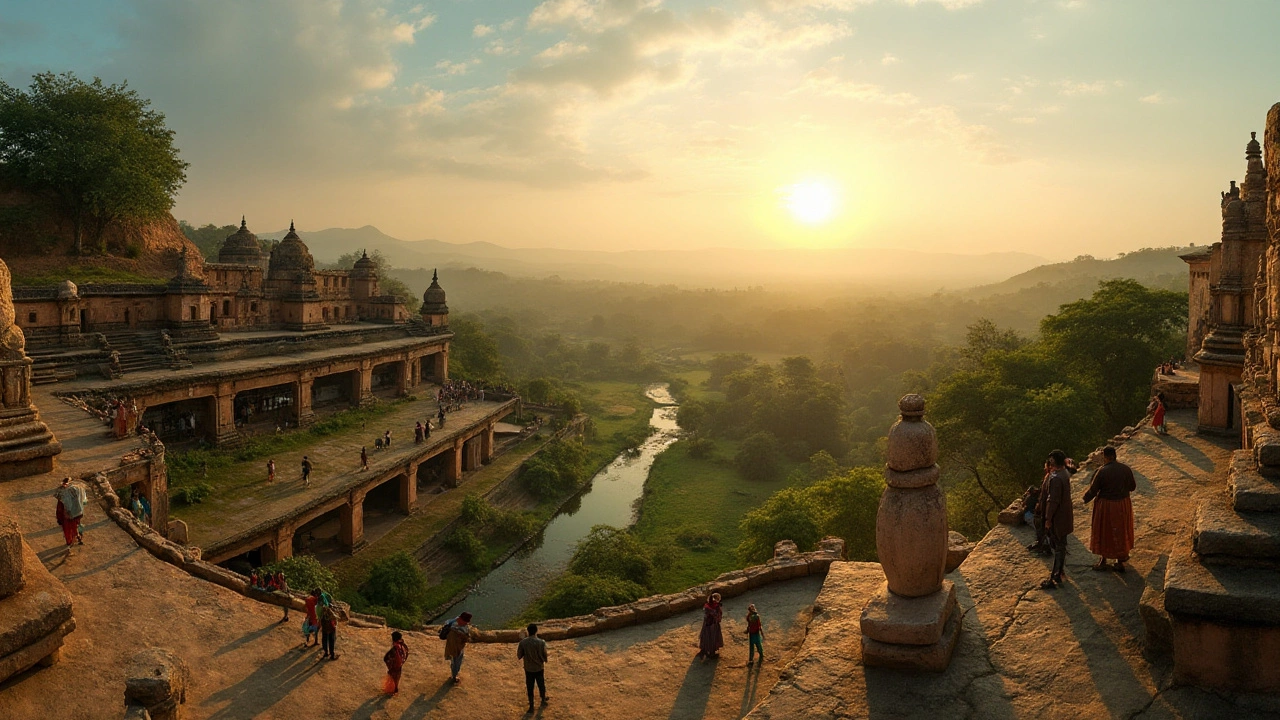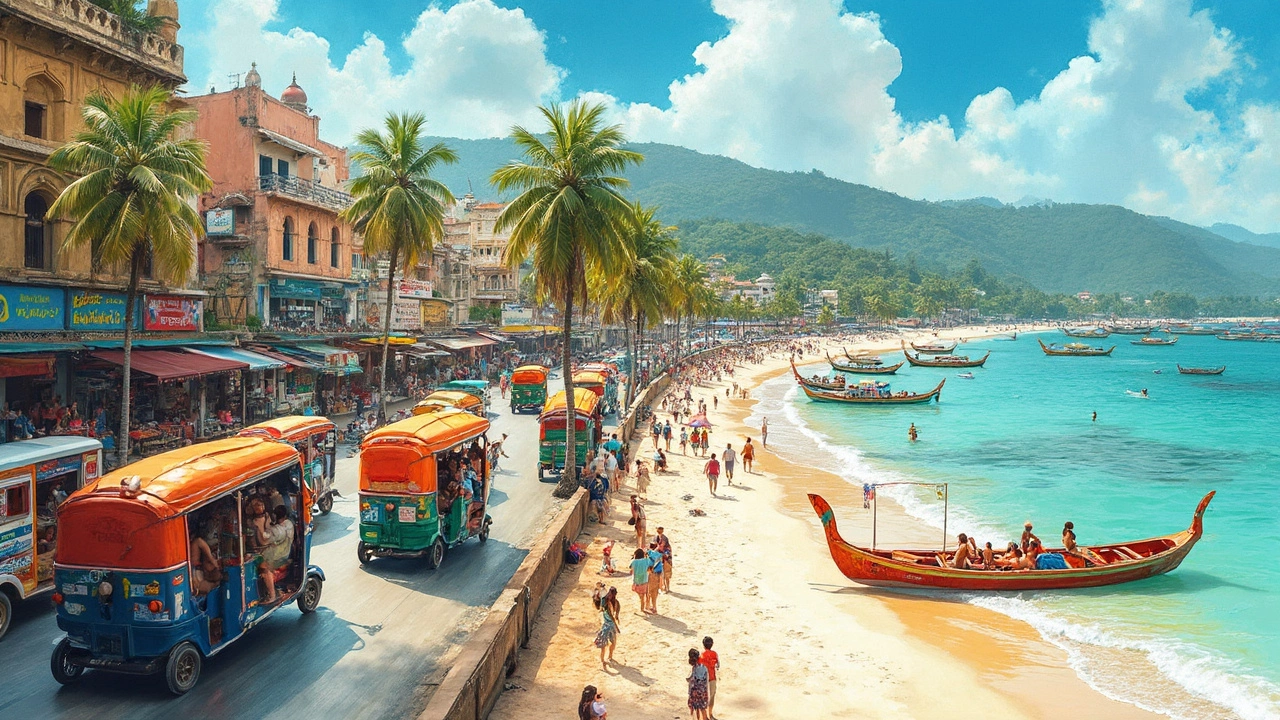Exploring India's Oldest Temple Festivals: A Journey Through Time
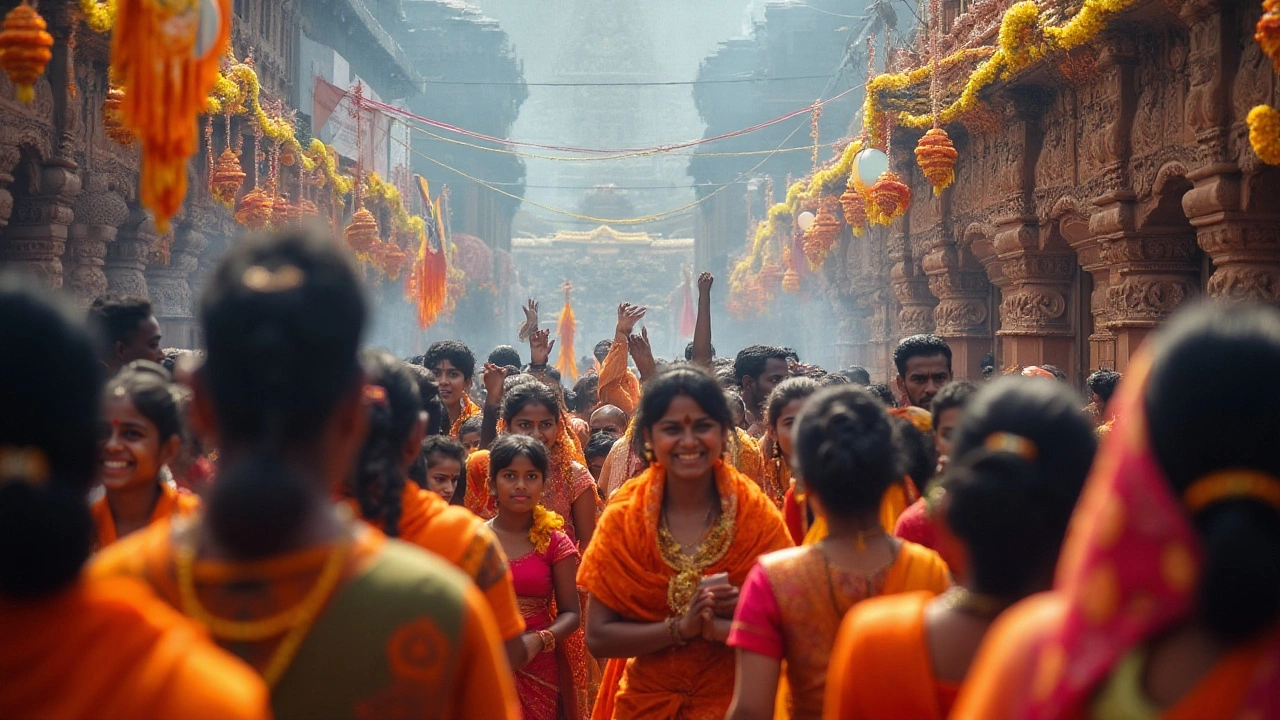
India is a kaleidoscope of cultures, and its temple festivals are a testament to the country's vibrant traditions and rich spiritual heritage. Among these festivals, one stands out for its ancient origins and mesmerizing rituals—the Madurai Meenakshi Thirukalyanam. Celebrated in the heart of Tamil Nadu, this festival offers a glimpse into the ancient practices that have been preserved through generations.
The festival, dedicated to Goddess Meenakshi and Lord Sundareswarar, is a magnificent spectacle that draws thousands of worshippers and curious travelers from around the world. Each year, the festivities bring the city of Madurai to life, with colorful processions, traditional music, and divine rituals that paint the streets in hues of devotion and joy.
- Introduction to Temple Festivals in India
- History of the Oldest Temple Festival
- The Significance of Madurai Meenakshi Thirukalyanam
- Cultural Activities and Celebrations
- Tips for Visitors
- Conclusion: Embracing the Timeless Traditions
Introduction to Temple Festivals in India
India is a land where history and tradition intertwine seamlessly, especially evident in its numerous temple festivals. These festivals are not just religious celebrations; they are a way for communities to come together and celebrate their cultural identity. These gatherings span days, or even weeks, becoming a spectacle of sound, color, and devotion that captivates both local devotees and global travelers alike. The oldest temple festival, the Madurai Meenakshi Thirukalyanam, is a quintessential example of such vibrant and enduring traditions, continuing to enthrall people with its divine fervor and historical significance.
Temple festivals in India can be traced back thousands of years, with many rooted in ancient scriptures and local legends. These festivals often revolve around significant religious events, celebrating deities and their mythical journeys or historic victories over evil. The grandeur and intricacy of these celebrations often mirror the architectural magnificence of the temples themselves. Each festival offers a window into ancient practices, where rituals are performed with precise adherence to tradition, passed down through generations. It's a living history lesson, providing glimpses into the spiritual and cultural ethos of India's past.
"Temple festivals in India are a fusion of spirituality, art, and culture, providing a deep understanding of the ancient world and its connection with the divine," noted eminent historian and cultural expert, Dr. Radhakrishnan Sharma.
The diversity of temple festivals across India is as vast as the country itself. From the elaborate Rath Yatra in Puri to the serene boat race festivals in Kerala, each region has its unique way of celebrating its deities. These festivals not only highlight regional variations in worship but also underscore the shared cultural thread that binds the nation. The cultural heritage displayed during these festivals is invaluable, as they preserve and pass on the rich tapestry of traditional music, dance, and art forms often unique to each locality. Through these festivals, one can witness not only the devotion of the masses but also the true spirit of 'unity in diversity', a phrase often used to describe India's social fabric.
To truly experience the essence of India, one must immerse in these temple festivals. They offer more than just a mere observation of rituals; there is a tangible warmth in the celebrations where locals and visitors alike are welcomed with open arms. Partaking in these events allows for a deeper connection to the land and its people, breaking barriers of language and culture. Pilgrims and tourists often plan their visits around these festivals for this very reason. Engaging in these festivals provides a unique insight into the robust life of temple towns, which transforms completely as soon as the festivities begin, breathing new life into the ancient structures and sacred courtyards.
Moreover, the economic impact of these festivals is significant, supporting local economies and often rejuvenating traditional crafts and trades. Artisans, performers, and vendors see a surge in demand for their products, making these festivals crucial for preserving local art forms and livelihoods. Despite the challenge of growing modernization, many communities fiercely protect and preserve these traditions, recognizing their importance not only as a religious observance but as cultural cornerstones.
History of the Oldest Temple Festival
The Madurai Meenakshi Thirukalyanam is not just any festival; it is a spectacular celebration that traces its roots back thousands of years, making it the oldest temple festival in India. This grand event is anchored in the storied past of the Madurai region, a place renowned for its historical and spiritual significance. The legend of this festival intertwines with the tale of the divine wedding of Goddess Meenakshi and Lord Sundareswarar, an event believed to have celestial origins. According to ancient scriptures, the city of Madurai was once ruled by King Malayadhwaja Pandya, who was blessed with a miraculous daughter, Meenakshi, believed to be the incarnation of the goddess Parvati. Her wedding to Sundareswarar, the incarnation of Lord Shiva, is celebrated annually with unfaltering fervor. The rituals and cultural activities are deeply rooted in the rich traditions passed down from the Sangam era.
Historically, the festival’s grandeur can be traced back to the 3rd century BCE, with documented references in Tamil literature, including the Sangam poems that reveal the deep spiritual ethos and the vibrant cultural life of the time. As centuries unfolded, this cultural heritage evolved, gaining influence from various dynasties like the Cholas and the Nayaks, who left indelible marks on the temple architecture and the festival’s customs. The ancient Meenakshi Temple, where this festival is centered, stands as a marvel of Dravidian architecture and epitomizes the artistic and architectural proficiency of those eras. It’s fascinating to think about how these rituals, which have endured the test of time, were meticulously preserved and cherished by the locals and rulers alike.
Dr. Kamal K. Mishra, a noted Indologist, once remarked, "The Madurai festival is a living testimony to the timelessness of India's spiritual and cultural lifeblood that connects us to our ancestral roots."
The participation of diverse communities in the festival narrates a story of unity, linking individuals from different walks of life through shared traditions and beliefs. A key aspect of its endurance is the blending of mythology with tangible cultural expressions, a symbiosis reflected in the art forms, dance, and music that thrive during the ten-day-long festival. Visitors often marvel at the grand processions, where magnificently decorated idols are paraded across the city, akin to scenes described in ancient texts. Each year, the festival witnesses a resurgence of local art and crafts that are showcased in the bustling temple bazaars, reminiscent of a bygone era where these trades flourished. This timeless appeal of the Madurai Meenakshi Thirukalyanam ensures its place in the heart of India’s cultural narrative and continues to entice countless travelers to immerse themselves in the tapestry of customs that define the nation.
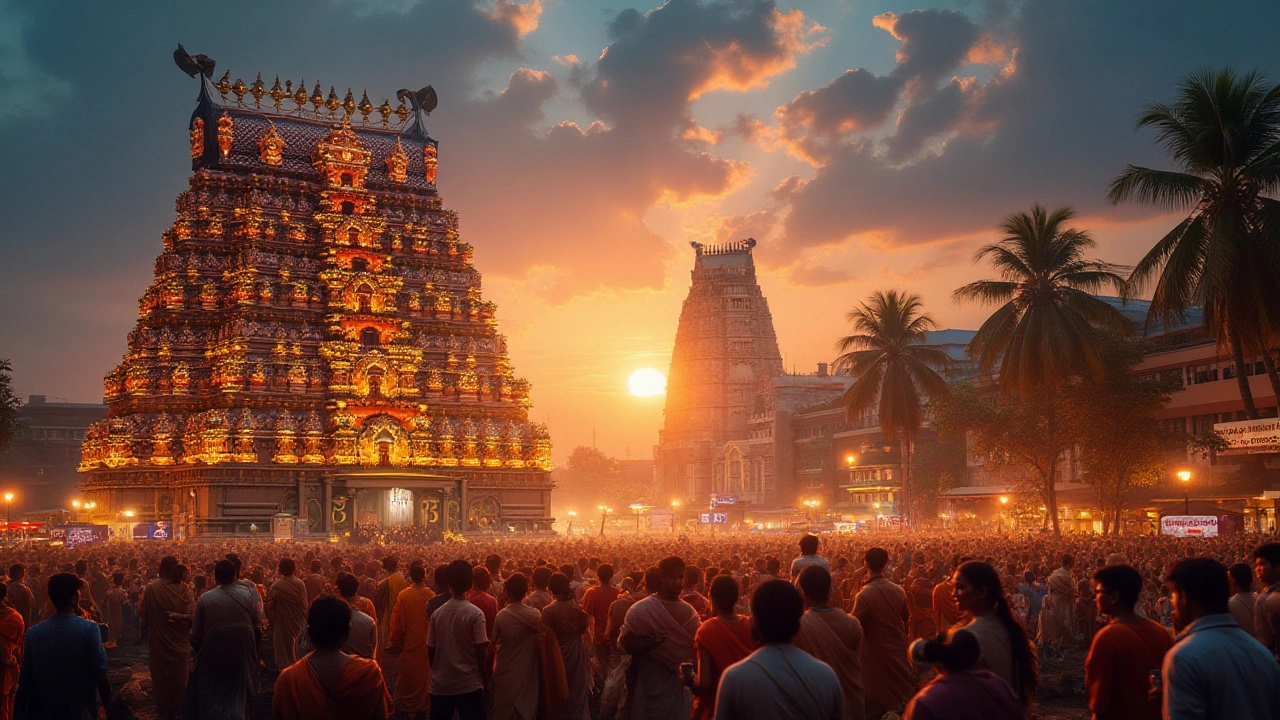
The Significance of Madurai Meenakshi Thirukalyanam
The Madurai Meenakshi Thirukalyanam isn't just another festival; it's the heartbeat of the city's cultural and religious life, reaching back thousands of years. The lush history surrounding this temple festival features the divine union of the deities Meenakshi and Sundareswarar, which symbolizes prosperity, abundance, and cosmic harmony. According to mythology, Meenakshi is none other than Parvati, the consort of Shiva, who was born with celestial powers. Her connection to Madurai is deeply ingrained in the psyche of the local populace, making the festivities not only a grand celebration but also a deep reaffirmation of faith and tradition.
The profound significance of the festival can also be understood through the intricate rituals and ceremonies that take place over a ten-day period. Each day represents a unique aspect of the divine love story, bringing age-old stories from Hindu texts to life. An aspect that remains deeply compelling is the famous chariot processions, where the deities are paraded around the city. This procession not only brings the divine closer to worshippers but is a powerful reminder of their ancient beliefs. This is where the beauty of India's cultural heritage comes into play; these acts of devotion create a bridge, connecting every generation to their roots.
The festival coincides with Chithirai, the first month of the Tamil calendar, marking a propitious time for new beginnings. It's an extravaganza combining elaborate decorations and traditional crafts, manifested through the beautifully adorned Meenakshi Amman Temple. Every edge of the temple comes alive; pillars echo with chants, and the air is thick with the fragrant aura of incense and flowers. This is not merely a display but a vibrant canvas painted with faith, devotion, and the indomitable spirit of temple tours across India.
"The Madurai Meenakshi Thirukalyanam reflects the soul of Tamil Nadu, a timeless dance of devotion, where every participant is a storyteller of the eternal union between the divine," remarked acclaimed historian Dr. Indira Viswanathan.Delving deeper, one finds the socio-economic implications of this festival. It's a boon for local artisans and vendors, showcasing their crafts to scores of visitors, generating lively trade and boosting local economies. The festival acts as a catalyst, drawing tourists into a whirlwind of spirituality and commerce.
Through the lens of modernity, the Madurai Meenakshi Thirukalyanam has managed to retain its ancient charm. While technology seeps into every aspect of life, this festival stands resilient, offering a place where time seems to pause. Imagine these sacred events not as relics of the past, but as living cultural chronicles speaking directly to the heart, emphasizing roles of tradition and community in a swiftly transforming world. When you step into this festive whirlwind, you don't just witness history; you become part of its living, breathing chronicle.
Cultural Activities and Celebrations
The Madurai Meenakshi Thirukalyanam festival is not just a religious observance; it is a vibrant tapestry woven with an array of cultural activities that bring the centuries-old traditions of India to life. The grandeur of the festival is reflected in its myriad celebrations, starting with the ceremonial procession of the temple deities, known as the 'Chithirai Thiruvizha'. This grand event marks the dramatic retelling of divine weddings through colorful parades, with devotees adorning the streets in stunning traditional attire. The intricate decorations of the temple, coupled with the fervent chants of hymns, set an ethereal ambiance that transports visitors to a bygone era.
Each day of the festival showcases a unique facet of India’s cultural heritage. The Azhagar festival, which follows, is a spectacle where Lord Vishnu is carried in a dazzling procession from the Kallazhagar Temple to the Vaigai River. It's a breathtaking sight as thousands gather to witness the deity’s passage, symbolizing prosperity and blessings for the entire city. This vibrant event resonates with mythological significance, drawing its roots from ancient texts and legends passed down through generations.
The festival also features captivating performances of classical dances such as Bharatanatyam and traditional music recitals that echo the spiritual essence of the region. These performances often narrate beloved stories from Hindu mythology, entrancing the audience with their graceful movements and expressive gestures. Traditional craftsmen set up stalls around the temple premises, offering a glimpse into the intricate art forms of Tamil Nadu, from delicate silk saris to exquisite handcrafted jewelry.
Immersed in the celebrations are culinary traditions that showcase the region's unique flavors. From spicy curries to sweet delicacies like 'laddu' and 'murukku', the food stalls around the temple offer a feast for the senses. Pilgrims and travelers alike relish these authentic dishes that have been part of the cultural fabric for centuries. The local community's involvement in organizing these events speaks volumes about their devotion and the deep-rooted cultural unity they share.
In one of the most interesting traditions, the festival includes a vibrant float parade on the Mariamman Teppakulam, which is the largest temple tank in India. Beautifully illuminated and carrying effigies of the gods, the floats glide across the water, reflecting the shimmering lights and adding a magical touch to the night sky.
"The festival is a beautiful amalgamation of devotion, art, and communal spirit, offering an unforgettable experience for those yearning to connect with India’s cultural heritage." – Dr. Lata Ganesh, Cultural Historian
These celebrations are not solely for the devout; they invite travelers from all walks of life to delve into India’s oldest traditions and witness the harmonious blend of spirituality and culture. As each year passes, the festival continues to evolve, yet it holds steadfast to its roots, preserving the ancient rituals that define its existence. Visiting the Madurai Meenakshi Thirukalyanam festival is a personal journey through time, one that enchants and enriches the soul.
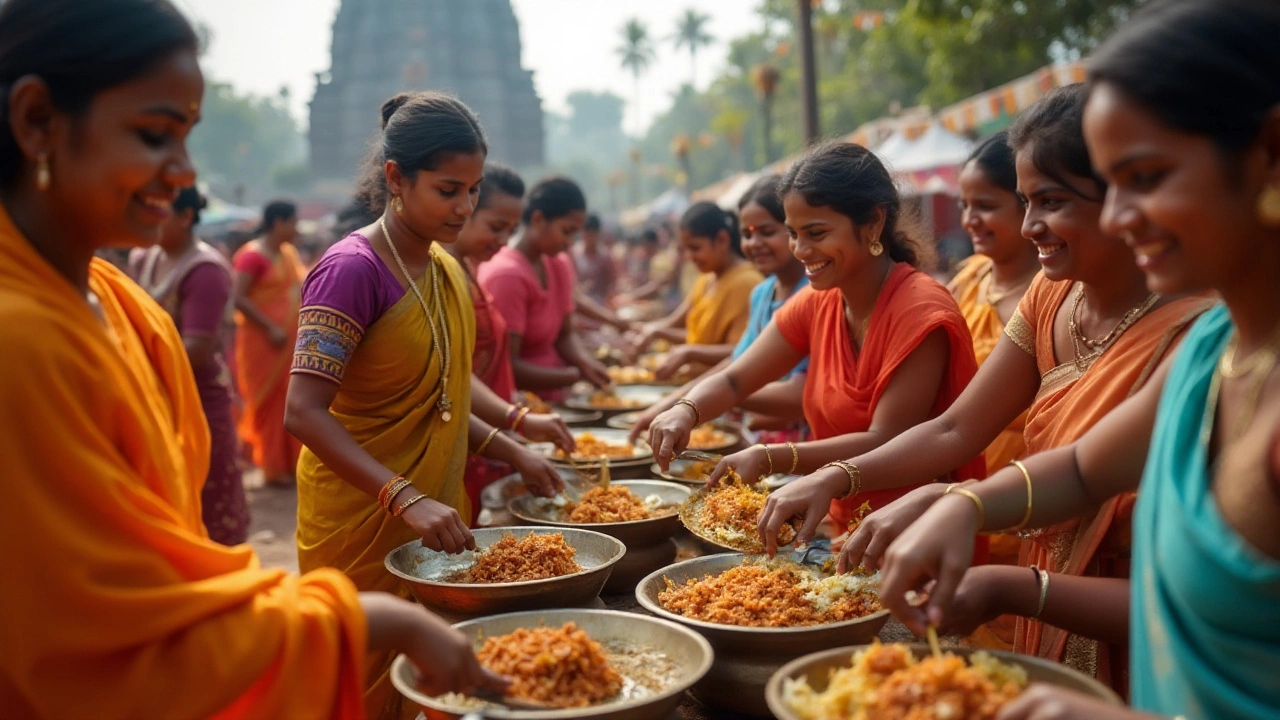
Tips for Visitors
Planning a visit to the oldest temple festival in India, the Madurai Meenakshi Thirukalyanam, requires a thoughtful approach to make the experience both memorable and enjoyable. The bustling city of Madurai, known for its rich history and cultural significance, plays host to this grand event each year. Visitors are advised to time their arrival well in advance, as the festival attracts throngs of devotees and tourists alike, leading to crowded accommodations and transportation. Ideally, one should aim to reach Madurai a few days before the festival begins, allowing some time to soak in the city's historical sites such as the Thirumalai Nayakkar Mahal and the Gandhi Memorial Museum.
Understand the cultural nuances and religious sentiments associated with the festival, as respecting local customs is of paramount importance. Wearing traditional attire is highly recommended, not only as a sign of respect but also to blend with the joyful procession of dancers and musicians that fill the streets. Regular clothing stores and local markets offer a variety of traditional garments tailored to fit all visitors. It is also beneficial to learn a few basic phrases in Tamil, the regional language, to enhance interaction with local artisans and vendors offering handmade souvenirs and delectable local cuisine.
The temple grounds will be immensely crowded during the festival, particularly during the celestial wedding of Meenakshi and Sundareswarar. Edging themselves among throngs of visitors can seem daunting, but the tangible fervor of devotion shared among the crowds is an experience unlike any other. High-quality earplugs can be useful for those sensitive to loud noises, especially during nighttime celebrations filled with traditional music and firecracker displays. Additionally, keeping hydrated and sun-protected is crucial, as April's tropical humidity is often joyous yet scorching.
The Madurai Meenakshi Thirukalyanam has been famously quoted by Anna Dey as, "a vibrant symphony of tradition and festivity brought alive within the sacred cityscape," highlighting its everlasting charm.
Transportation within Madurai can be carried out using auto-rickshaws, but seasoned travelers often recommend hiring a local guide to navigate the festival's venue promptly. Guides share humorous anecdotes and hidden stories about temple festivals from history, enriching the visitor's journey. Compact maps and mobile GPS apps ensure that none of the attractions go unnoticed. Finally, it should be noted that although Indians share a warm hospitality, maintaining vigilance regarding personal belongings is advised, especially in busy crowd gatherings. By keeping these tips in mind, one can fully immerse in the ethereal experience of participating in the Madurai Meenakshi Thirukalyanam.
Conclusion: Embracing the Timeless Traditions
The Madurai Meenakshi Thirukalyanam is more than just a temple festival; it's a living tale of India's profound historical and spiritual tapestries. The ceremonies unfold with such vibrancy, connecting modern attendees with the epochs of ancient times. This intertwining of the past and present keeps the narrative of devotion and community intact, reminding us that some traditions are as timeless as they are relevant. This festival invites people to explore how age-old beliefs still play a role in contemporary life, offering a unique perspective on how cultures preserve and adapt their heritage.
Attendees often find themselves mesmerized by the festival's orchestration; each element—be it music, dance, or prayer—plays a critical role in weaving the episodic narrative of divine union. The festival not only serves as a spiritual awakening for many, but it also fosters a sense of unity among the vast sea of devotees and visitors. Sharing stories, exchanging insights, and immersing oneself in the cultural essence are parts of what makes the experience unforgettable. As more people partake in temple tours during such festivals, they become both observers and participants in a cultural pageant that transcends time and geography.
The intricate dancers and artisans also shine during this festival, showcasing skills passed down through generations, each performance a testament to India's dedication to keeping artistic traditions alive. These displays often evoke a sense of pride among locals and amazement in tourists, who get a firsthand glimpse of India's rich cultural legacy. Notably, renowned Indian historian Dr. R. Venkatraman once noted:
"Such festivals are the heartbeat of India's cultural and spiritual identity, echoing the nuances of a civilization that thrives on unity in diversity."Such festivals inherently encourage the younger generation to engage with their roots, understanding their ancestors' ways while imbibing a sense of acceptance toward various cultural narratives.
There's a responsibility on all of us to help safeguard these incredible festivals for future generations. As you traverse the bustling streets of Madurai during Meenakshi Thirukalyanam, you become part of something much larger—a movement toward cultural appreciation and preservation. Each step taken in the city during the festival is a gesture of commitment to cherishing the past, revering the present, and anticipating the future. By attending and participating, you play a role in ensuring that these inspirations live on, echoing India's indefatigable spirit and unyielding traditions.
For travelers planning to participate, embracing proper etiquette and learning a bit about the local customs enrich the experience further. As you explore India's oldest temple festivals, you're not just observing a spectacle; you're stepping into a living museum, a theatre where the most beautiful narratives unfold unnoticed by time. Embrace these moments fully, for they offer an unparalleled view of the cultural heritage that defines this incredible land.

